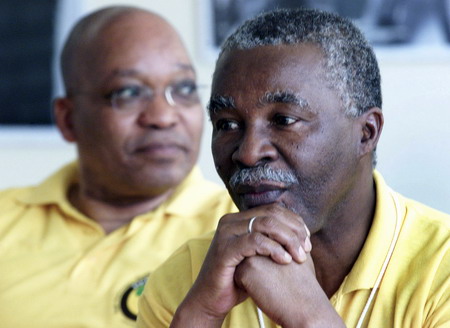JOHANNESBURG, South Africa -- President Thabo Mbeki bowed to heavy pressure from his own party to resign, tossed to the sidelines of the economic powerhouse he built up as punishment for allegedly abusing his power in trying to quash a popular rival.

South Africa's President Thabo Mbeki (R) and the then Deputy-President Jacob Zuma address a press conference in Cape town in this December 18, 2002, file photo. South Africa's ruling party had decided to recall President Thabo Mbeki before the end of his term next year and he had pledged to accept the move and step aside voluntarily. The move follows the dismissal of corruption charges last week against Zuma, fired by Mbeki as the country's Deputy-President in 2005. [Agencies]
|
The swiftness of Saturday's ouster likely will stoke fears about the political and financial direction of South Africa, particularly if key Cabinet ministers decide to quit in solidarity with Mbeki.
But the change also allows the governing African National Congress to declare its internal leadership battle over and turn its attention to next year's elections, when key concerns will be about corruption and demands from the poor for jobs and houses.
Even as it demanded he step down, the ANC praised Mbeki for overseeing unprecedented growth. But little of the wealth created since he succeeded Nelson Mandela in 1999 has trickled down to the black majority that had hoped for more with the end of apartheid.
The result is that poor blacks have flocked to the ANC's populist leader, Jacob Zuma, a one-time Mbeki protege who became a potent foe. He is considered front-runner for next year's presidential election, but parliament will pick an interim leader to take over from Mbeki.
While Zuma and Mbeki espouse similar views of South Africa's future, they differ sharply in style. Aloof and donnish, Mbeki won praise from business but never attained the public support enjoyed by the personable, energetic Zuma, particularly among leftists, union members and young people.
Many poor people lionize Zuma as a leader who understands the pain of the millions of South Africans who remain on the margins of society.
The Young Communist League said Mbeki's departure gives the government "an opportunity to intensify the provision of quality services to our people, especially the working class and the poor."
Mbeki came under pressure from his party to quit following a judge's ruling last week that he may have had a role in Zuma being charged with corruption. Mbeki, who was due to leave office next year after two terms as president, denied that but gave in to the demands Saturday.
The ANC's secretary-general, Gwede Mantashe, said Mbeki would remain president until an interim one was appointed, but Mbeki was already stepping back. He sent the foreign minister to head the delegation Mbeki had planned to take to the U.N. General Assembly.
Mantashe said parliament, which is controlled by the ANC, would meet soon to formalize the process for replacing Mbeki. Parliament elects the president in South Africa.

